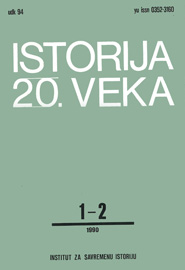HRVATSKI METROPOLITA ANTUN BAUER
THE IDEOLOGICAL AND POLITICAL ACTIVITY OF CROATIAN METROPOLITAN ANTUN BAUER
Author(s): Nikola ŽutićSubject(s): Christian Theology and Religion, History of Church(es), Theology and Religion, 19th Century, Pre-WW I & WW I (1900 -1919), Interwar Period (1920 - 1939)
Published by: Institut za savremenu istoriju, Beograd
Keywords: Antun Bauer; theology; Christianity; Croatia; Croatian metropolitan;
Summary/Abstract: The main characteristics of Bauer’s ideological conviction can be narrowed down to consistent clericalism and anti-liberalism. Bauer promoted the ideas of the Catholic Movement and the Catholic Action, advocating the revival of catholic spirituality through the educational system, the press and new orders and congregations. He viewed ideas of „naturalism and Darwinism”, supported by bourgeois liberalism, with contempt, seeing them as earthly and subjective human products and he successfully lent an „ethnic” aspect to the Roman Catholic ideology by representing the South Slavic population as exclusive in comparison with the adherents of other confessions. Together with the Catholic bishopric, Archbishop Bauer wished to draw the Croatian and Slovenian people away from liberal „masonic” bourgeois misconceptions and to lead them to the fundamental values of „true Christian culture” . Bauer praised the Croatian people as the „bulwark of Christianity" (antemurale christianitatis) against the „schismatic” east. He considered the attack of the Austro-Hungarian Empire on Serbia in 1914 through the prism of the defense of Catholicism against Serbian „piemontism” . Having realized that the defeat of the Hapsburgs was inevitable, Bauer acquiesced to the revolutionary events of October 29th and December 1st in 1918, fearful of the expansion of liberalism from bourgeois Italy, where the anti-clerical tradition of the „Risorgimento” continued. The disappearance of orthodox Russia, however, widened the possibilities of proselytism, that is of spreading the Roman Catholic faith among the orthodox. The Kingdom of the Serbs, Croatians and Slovenians was to serve as a bridge for propagating Roman Catholic pan slavism in the orthodox east. Due to reasons mentioned above, the ideological climate in Yugoslavia would consequently lead A. Bauer to the anti-Yugoslav camp, regardless of his initial inclination towards the Yugoslav state, apparent in 1918 and 1919. Namely, due to the dominant influence of bourgeois liberalism, laical anti-clericalism would play a significant part in the political, economic and cultural life of the Kingdom of Yugoslavia. Bauer, therefore, fought a „cultural battle" in the sphere of education against the state’s „irreligious” educational policy and considered the agrarian reform to be an assault on the part of the State on catholic „religious endowments”, which provided the means for the maintenance of the cultural institutions of the Church.
Journal: Istorija 20. veka
- Issue Year: 1990
- Issue No: 1+2
- Page Range: 175-188
- Page Count: 14
- Language: Serbian

